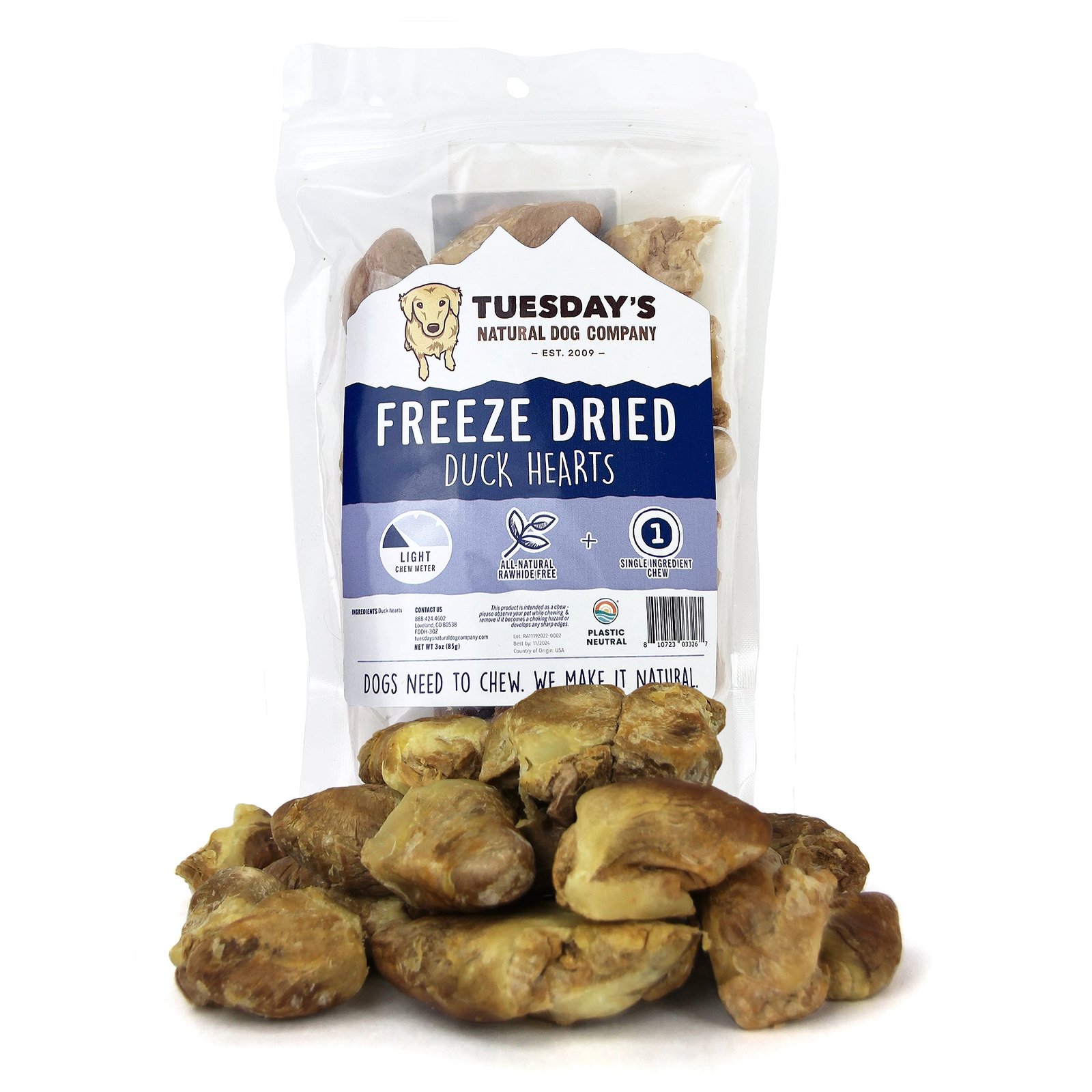Are Duck Hearts Good for Dogs? Discover the Benefits! Yes, duck hearts are nutritious and safe for dogs. They provide protein, vitamins, and essential fatty acids.
Duck hearts offer a delicious and healthy treat option for dogs. Rich in protein and low in carbohydrates, they support muscle growth and overall health. These organ meats are packed with essential nutrients like iron, zinc, and B vitamins, contributing to your dog’s vitality.
Incorporating duck hearts into your dog’s diet can enhance their meal variety and flavor, making it an appealing choice for picky eaters. Remember to introduce any new food gradually and consult your veterinarian if you have concerns. Whether cooked or served raw, duck hearts can be a tasty addition to your dog’s nutrition plan, promoting a balanced diet and keeping them satisfied.
Table of Contents
Introduction To Duck Hearts As Dog Food
Duck hearts are gaining popularity as a nutritious option for dogs. They offer a unique taste and several health benefits. Many pet owners seek natural, protein-rich foods for their furry friends. Duck hearts fit that bill perfectly.
Nutritional Profile
Duck hearts are packed with essential nutrients. They provide a range of health benefits for dogs. Here is a breakdown of their nutritional profile:
| Nutrient | Amount per 100g |
|---|---|
| Protein | 25g |
| Fat | 9g |
| Iron | 2.5mg |
| Zinc | 2.4mg |
| Vitamin B12 | 7.0µg |
These nutrients support your dog’s overall health. They promote strong muscles and a healthy coat. Duck hearts also provide energy for active dogs.
Popularity In Pet Diets
Duck hearts are becoming a favorite among pet owners. Many choose them for a few key reasons:
- High Protein Content: Dogs need protein for muscle health.
- Unique Flavor: Most dogs love the taste of duck.
- Variety: They add variety to a dog’s diet.
- Easy to Prepare: Duck hearts are simple to cook.
As more pet owners look for alternative proteins, duck hearts stand out. They are a great addition to homemade dog meals. Many commercial dog foods also include duck hearts.

Credit: thenaturaldogcompany.com
Key Nutrients In Duck Hearts
Duck hearts offer valuable nutrients for dogs. They can enhance your dog’s diet. Understanding these nutrients helps you make informed choices.
Rich In Protein
Duck hearts are a fantastic source of protein. Protein is crucial for your dog’s health. It helps in muscle development and repair.
- Supports strong muscles
- Aids in tissue repair
- Boosts energy levels
Each serving of duck hearts provides a high amount of protein. This makes them an excellent choice for active dogs. Compare duck hearts to other protein sources:
| Protein Source | Protein Content (per 100g) |
|---|---|
| Duck Hearts | 25g |
| Chicken Breast | 31g |
| Beef | 26g |
Important Vitamins And Minerals
Duck hearts are packed with essential vitamins and minerals. These nutrients support overall health and well-being.
- Vitamin B12: Important for nerve function and red blood cell formation.
- Iron: Vital for oxygen transport in the blood.
- Zinc: Supports immune system function and skin health.
These nutrients play key roles in your dog’s health:
- Boosts energy levels
- Enhances immune response
- Promotes healthy skin and coat
Including duck hearts in your dog’s diet can provide numerous benefits. They are a tasty treat packed with nutrients.
Benefits Of Duck Hearts For Dogs
Duck hearts are a nutritious treat for dogs. They offer several health benefits. These benefits support your dog’s overall well-being. Let’s explore the key advantages of duck hearts.
Supports Muscle Development
Duck hearts are rich in protein. Protein is essential for muscle growth. This helps your dog stay strong and active. A strong muscle structure supports agility and endurance.
- High-quality protein source
- Supports muscle repair and growth
- Helps maintain healthy body weight
Enhances Energy Levels
Duck hearts provide a boost of energy. They contain important nutrients. These nutrients fuel your dog’s daily activities. An energetic dog enjoys playtime and exercise.
| Nutrient | Benefit |
|---|---|
| Iron | Supports oxygen transport in the body |
| Vitamin B12 | Boosts energy metabolism |
Promotes A Healthy Coat
A diet rich in duck hearts can improve your dog’s coat. Healthy fats in duck hearts nourish the skin. This leads to a shiny and soft coat. A good coat protects against environmental factors.
- Contains essential fatty acids
- Reduces skin irritations
- Promotes a lustrous appearance
How To Safely Introduce Duck Hearts Into Your Dog’s Diet
Introducing duck hearts to your dog’s diet can be beneficial. Start slowly. Monitor your dog’s reaction. Follow these guidelines for a safe transition.
Portion Control
Portion control is vital when adding duck hearts. Too much can upset your dog’s stomach. Use the following table to determine the right amount:
| Dog’s Weight | Recommended Serving Size |
|---|---|
| Up to 10 lbs | 1/2 heart per week |
| 11 to 30 lbs | 1 heart per week |
| 31 to 50 lbs | 2 hearts per week |
| Over 50 lbs | 3 hearts per week |
Always adjust portions based on your dog’s overall diet. Consult with your vet for personalized recommendations.
Preparation Tips
Proper preparation is essential for duck hearts. Follow these steps:
- Wash the hearts thoroughly under cold water.
- Remove any excess fat or connective tissue.
- Cut the hearts into smaller pieces for easy chewing.
- Cook the hearts lightly to kill any bacteria.
Cooking can enhance flavor and digestibility. Always let them cool before serving.
Frequency Of Feeding
Feeding frequency plays a critical role. Start with once a week. Gradually increase as your dog adjusts. Monitor for any digestive issues.
- Watch for signs of allergies or upset stomach.
- Keep a consistent feeding schedule.
- Mix duck hearts with regular meals for variety.
Stick to the recommended frequency. This ensures a balanced diet for your dog.
Potential Concerns With Duck Hearts
Feeding your dog duck hearts can be beneficial. However, there are some potential concerns. It’s important to be aware of these issues before adding duck hearts to your dog’s diet.
Allergic Reactions
Some dogs may have allergies to duck meat. Symptoms of an allergic reaction can include:
- Itching and scratching
- Red or inflamed skin
- Gastrointestinal upset
Watch for any signs of allergies. If you notice symptoms, stop feeding duck hearts. Consult your veterinarian for guidance.
Risk Of Choking
Duck hearts are small but can pose a choking hazard. This is especially true for:
- Small dogs
- Dogs that eat quickly
To reduce choking risks:
- Cut duck hearts into smaller pieces.
- Supervise your dog while they eat.
Proper Storage
Storing duck hearts correctly is essential for safety. Follow these tips:
| Storage Method | Description |
|---|---|
| Refrigeration | Store in an airtight container. Use within 2-3 days. |
| Freezing | Freeze for long-term storage. Use within 3-6 months. |
Always check for signs of spoilage before feeding. Discard any expired or questionable duck hearts.

Credit: www.socalrawfeddogs.com
Comparing Duck Hearts With Other Protein Sources
Duck hearts are a tasty protein source for dogs. They offer various nutrients. Let’s compare duck hearts with other popular protein options. This will help you choose the best for your furry friend.
Chicken Hearts Vs. Duck Hearts
Chicken hearts and duck hearts both provide excellent nutrition. Here’s a quick comparison:
| Nutrient | Chicken Hearts | Duck Hearts |
|---|---|---|
| Protein | 25g | 22g |
| Fat | 10g | 12g |
| Iron | 2.5mg | 3mg |
| Vitamin B12 | 1.5µg | 2µg |
Both options are rich in protein. Chicken hearts have slightly more protein. Duck hearts contain more fat. This can help with energy levels. Duck hearts also have more iron and vitamin B12. These nutrients support a dog’s overall health.
Beef Vs. Duck Hearts
Beef hearts are another protein source. They are popular among dog owners. Let’s see how they compare to duck hearts:
| Nutrition | Beef Hearts | Duck Hearts |
|---|---|---|
| Protein | 26g | 22g |
| Fat | 15g | 12g |
| Iron | 4mg | 3mg |
| Vitamin B12 | 2.2µg | 2µg |
Beef hearts have the highest protein and fat content. They also contain more iron. This makes them a strong contender. Duck hearts provide a leaner option. They still offer great nutrition.
Choosing between these options depends on your dog’s needs. Consider their health, energy levels, and preferences. Each protein source has unique benefits.
Owner Experiences: Real Stories
Many dog owners share their experiences with feeding duck hearts. These stories reveal the benefits and challenges. Let’s dive into some real-life accounts from pet owners.
Success Stories
Many pet owners report positive experiences with duck hearts. Dogs often love the taste and texture. Here are some success stories:
- Boosted Energy: Owners noticed their dogs have more energy.
- Improved Coat: Several dogs showed shinier, healthier fur.
- Better Digestion: Owners reported fewer stomach issues.
- Allergies Reduced: Some dogs had fewer allergy symptoms.
One owner, Sarah, said, “My dog, Max, loves duck hearts. His coat is so shiny now!”
Another owner, Tom, shared, “After adding duck hearts, Bella has so much energy!”
Challenges Faced
While many enjoy duck hearts, some face challenges. Here are common issues:
- Availability: Duck hearts can be hard to find in stores.
- Cost: Some owners find them expensive.
- Preparation: Proper cooking and storage can be tricky.
- Allergic Reactions: A few dogs had allergic responses.
Jessica, a dog owner, said, “I love duck hearts, but they are pricey!”
Another owner, Mike, mentioned, “My dog had an allergy. We had to stop.”
Overall, experiences vary. Duck hearts can be a great treat, but not for every dog.

Credit: www.amazon.ca
Frequently Asked Questions
Are Duck Hearts Safe For Dogs To Eat?
Yes, duck hearts are safe for dogs. They are a nutritious source of protein and essential nutrients. However, it’s important to feed them in moderation. Always consult your veterinarian before introducing new foods to your dog’s diet. Ensure they are cooked properly and free from additives.
What Are The Benefits Of Duck Hearts For Dogs?
Duck hearts offer several health benefits for dogs. They are rich in taurine, which supports heart health. Additionally, they provide essential vitamins and minerals. These nutrients can boost your dog’s energy levels and overall well-being. Incorporating duck hearts can contribute to a balanced diet.
How Should I Prepare Duck Hearts For My Dog?
To prepare duck hearts, start by thoroughly cleaning them. You can cook them by boiling or baking. Avoid using any seasoning or spices, as these can be harmful. Cut them into small pieces for easier consumption. Always allow them to cool before serving to your dog.
Can Puppies Eat Duck Hearts?
Yes, puppies can eat duck hearts in moderation. They provide valuable nutrients necessary for growth. However, introduce them gradually to avoid digestive upset. Always consult your veterinarian for age-appropriate dietary recommendations. Proper preparation is crucial to ensure their safety and health.
Conclusion
Duck hearts can be a nutritious treat for dogs. They are rich in protein and essential nutrients. Feeding them in moderation can support your dog’s overall health. Always consult your veterinarian before introducing new foods. By doing so, you ensure your furry friend enjoys a balanced and healthy diet.



